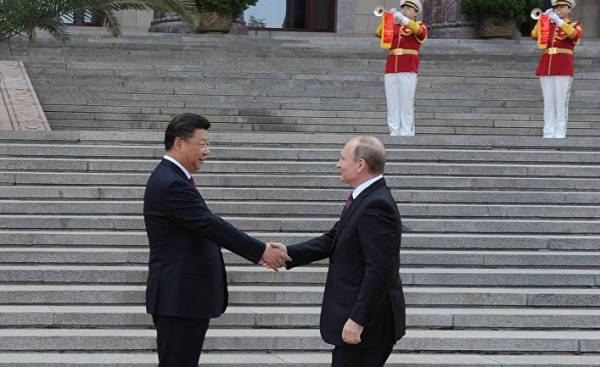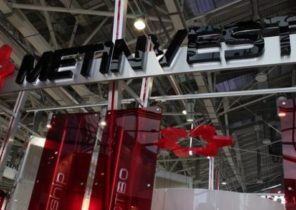
If you listen to some people, then Russia in the US there is no business. If you don’t count “LUKOIL” and the uranium mine, Russia for Americans no more than a fiction and a figment of the imagination. Russia has very little economic interests. But with China the story is quite different.
The truth is, in China, in Russia, too few cases. Foreign business in Russia is mainly Ukraine, Belarus, Kazakhstan and Europe, and Europe is the lion’s share. But the situation will change. If Russia is right play your cards right, China to its future, will become more important than the United States, and maybe even than Europe. A lot depends on whether Vladimir Putin to abandon his passions political intrigue and spy games, to focus on investment, development of companies from the private sector, and expansion of business in China. Chinese leader XI Jinping and his banks will be in this case tugs.
The initiative “One belt and one road”, sometimes called the “New silk road” is not quite through the land, but she comes to Moscow. Why doesn’t Russia help China in financing and building the “silk road”, especially since a significant part of it winds through the land on which once flew the flag of the Soviet Union?
In short, si need to Putin more than trump. In Russian-American relations is a lot of political wrangling and doomed to fail ideas. Washington and Moscow cannot cooperate, except minor joint work in the Arctic, the exchange of military information within the framework of the war on terrorism and the International space station. In Russia American multinational companies more than Russian multinational companies in the United States.
Moscow and Beijing are not as close as Beijing and Washington, but Russia can get from the “silk road” is much more benefits than the United States — if not by virtue of his geographical position, because of the American reluctance to support the Asian infrastructure investment Bank (AIIB). That is, the USA is more opposed to the “silk road” than Russia.
China sees the “Silk road” just business, nothing more. Si agree to Russian participation to the same extent as in the us.
“We hope to create a large family of harmonious coexistence,” he told si last week during a forum on “One belt and one road”. It was attended by Putin. Trump, of course, was not. Instead of himself he sent to China senior Director for Asia, national security Council Matthew Pottinger (Matthew Pottinger). “We hope that through the “silk road” we will be able to find new drivers of growth, to create a new framework for global development, and also to find a new balance of economic globalization,” said si. It should be understood that China in the future, ready to replace the U.S. in some regions of the world, acting as the heavyweight of global capitalism.
“Eurasia is the future”, — Putin said, knowing all is well. Along the route the “silk road” is home to almost 75% of the world population, and is more than half the world’s GDP.
In the Russian media, Putin’s trip to China is presented as another important step in the development of Russian-Chinese relations, and are talking about Moscow as an equal partner. For Russia, the only concrete result of this economic forum was the creation of the Russian-Chinese investment Fund regional cooperation and development. But these countries not for the first time create investment mechanisms, at least on paper. Two years ago they did the same thing with a joint venture in financing the Chinese agricultural production on the Russian border. And on the Moscow stock exchange, today you can directly carry trades in the yuan.
Putin turn to China occurred at a time when the Russian leader was tired of Europe (at least, so it seems, judging by the press).
During last year’s St. Petersburg international economic forum Putin in his speech praised the idea of “greater Eurasia”. From his point of view, Russia is a minor character in “the Silk road”. His “greater Eurasia” is similar to the Eurasian economic Union, Kazakh leader Nursultan Nazarbayev. While this fledgling trade bloc of former Soviet States, namely Kazakhstan and Russia.
In the international response to the “silk road” and in the preliminary analytical work focuses on the geopolitical consequences and implications for development, says Alexander Cooley (Alexander Cooley) the report, published in October by the Center for strategic and international studies (Center for Strategic and International Studies).
As for geopolitics, the “silk way” will strengthen China’s position in the international system and raise its role in global governance, especially in those regions that rely on its financing, and trade. And it makes Washington’s concern about the fact that new financial institutions like the AIIB will weaken the world Bank.
As for trade, we all know that Eurasia is a stagnant swamp, and that the markets there are only just emerging. This applies to more advanced economies, such as India and Kazakhstan. The former Soviet “Stans” is also very far behind in infrastructure construction and resources development. According to estimates by McKinsey & Company, for modernization of this region in the next decade will need at least eight trillion dollars.
Analysts readily acknowledge that the investment will meet the needs of Chinese companies and that many of the projects in these distant lands will fail. Overall, however, investors consider the potential positive socio-economic impact of the silk road. First and foremost, this applies to Chinese companies, which will build new bridges and to pave new roads. Russian too have opportunities, if they largely focus on business, not on politics. But Putin is Putin, and there is no certainty.
“Russian leaders first think about geopolitics, not trade,” writes Cooley. They believe that large-scale Eurasian construction under the leadership of China will weaken the Western sources of financing and, therefore, will reduce the Western influence in the region. Russia will gain more weight. But the Chinese will ultimately get so much more. Poor countries swear allegiance to those who protect them from enemies or fills their pockets with investment money.
Forbes billionaire Jack MA (Jack Ma) sings the praises of the “silk road”. In the future, when poor countries like Uzbekistan would start to buy goods via the Internet, it Alibaba can firmly gain a foothold there.
“The main difference “One belt one road” of the total globalization is that this initiative connects young people, women, small businesses and developing countries, he said last week to the correspondent the chief organ of the Chinese government People’s Daily. — The “silk road” aims to include as many people as possible. This responsibility and this opportunity.”
Meanwhile, Putin in Beijing has shown that he is a geopolitical player. He will be more closer with China than with the United States, for the simple reason that there are more economic opportunities and more hospitable China.
“In advancing this initiative, President XI Jinping has demonstrated an example of creative approach to the development of integration in energy, infrastructure, transportation, industry, and humanitarian cooperation as has just been explained in detail, — said Putin. We would welcome the participation of European colleagues, of course, the EU member States in this partnership.”
Alas, Putin’s statements like pills of poison.
Europe is also not a supporter of the expansionist plans of China. Like Washington, she argues that Chinese development banks will not take into account environmental requirements and labour law in the issuance of large loans for projects of “silk road”. The European Bank for reconstruction and development is the main creditor of the countries located along the route of the “silk road”, including Ukraine, which is now totally dependent on IMF and EBRD.
On Monday, the EU refused to support part of the initiative of China’s “silk road” because it does not include obligations of transparency, international standards of labour and environmental safety. “We have made clear that for Europe the initiative “One belt and one road” can be successful only if it is based on transparency, said yesterday The Guardian, a senior diplomat from the EU. — Europe is United in this matter.”
Back in the U.S., Pottinger said that American companies do not miss the opportunity to earn money.
“Us firms can offer goods and services at the best prices at any point in the project, he said. — They have a long and successful experience in the development of a global infrastructure, and they are ready to participate in projects of “One belt one road””.







